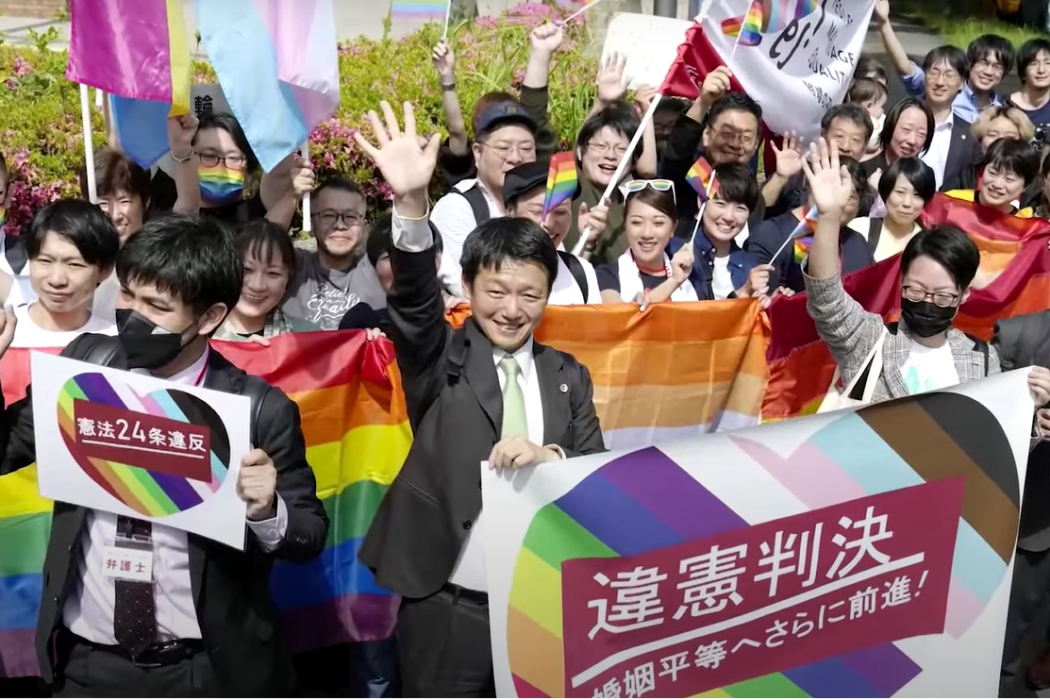(Photo Credits: Screengrab from Reuters’ Official YouTube Account)
TOKYO – A Japanese high court declared the nation’s refusal to legally recognize same-sex marriage as unconstitutional on Thursday. This decision, following a landmark verdict in 2021, amplifies pressure on the government to take stronger measures to safeguard sexual minorities.
The Sapporo High Court reaffirmed the previous ruling, stating that the absence of recognition for same-sex marriage violates constitutional principles of equality. However, it dismissed the claim for emotional distress damages totaling 6 million yen ($40,600) sought by three same-sex couples in Hokkaido.
Disappointed by the outcome, the plaintiffs intend to challenge the decision by appealing to the Supreme Court.
In a significant legal milestone, this ruling marks the first instance where a high court has weighed in on six lawsuits challenging Japan’s laws’ refusal to recognize same-sex marriage. The court deemed these provisions not only in violation of Article 14, guaranteeing the right to equality, but also Article 24, which stipulates marriage should be based on the mutual consent of “both sexes.”
In a groundbreaking declaration, the court affirmed that Article 24 can be interpreted to encompass marriages between individuals of the same sexes. Presiding Judge Kiyofumi Saito emphasized when handing down the ruling that while the Constitution’s enactment did not anticipate same-sex marriages, the clause “should be interpreted against the background where respect for individuals is more clearly considered.”
The ruling also emphasized that legalizing same-sex marriages would not result in any disadvantage or harm, including in terms of social impact. It stated that any discomfort or aversion towards same-sex marriages is solely based on “sensuous, emotional reasons” and can be addressed through the promotion of public awareness about the unnecessary differentiation between same-sex couples.
Despite increasing pressure from the LGBT community and its supporters, Japan remains the only Group of Seven major industrialized country that has not legalized same-sex marriage or civil unions.
The government has argued in the lawsuit that the Constitution presumes marriage is only between heterosexual couples.
Regarding the rejection of the plaintiffs’ claims for damages, the court explained, “It cannot be said that discussions at the Diet…regarding provisions not allowing same-sex marriage are clearly in violation of the Constitution.”
One of the plaintiffs expressed during a press conference in Sapporo that she was “encouraged by the forward-thinking” nature of the ruling.
At the district court level, varying opinions have been given regarding same-sex marriage, with the Tokyo District Court being the latest to issue a ruling on the matter earlier on Thursday.
The Tokyo court has determined that the absence of legal acknowledgment of same-sex marriage in Japan is unconstitutional, aligning with the rulings of the Tokyo and Fukuoka district courts in 2022 and 2023, respectively.
Similarly, the Sapporo and Nagoya district courts ruled the prohibition of same-sex marriage as unconstitutional in 2021 and 2023, while the Osaka District Court deemed it constitutional in 2022. Despite these rulings, all courts have rejected compensation claims.
In the recent ruling of the Tokyo District Court, Presiding Judge Tomoyuki Tobisawa highlighted the absence of legal provisions akin to heterosexual marriages for same-sex couples as “a deprivation of a key part of their personal identity.”
However, Tobisawa ultimately determined that it is not unconstitutional at present, suggesting that the Diet possesses “many options” to address the issue.
The eight plaintiffs, comprised of individuals in their 40s and 50s employed in various sectors and residing in Tokyo, argued that the government’s failure to legislate on the matter infringed upon their rights and caused them emotional distress. They had sought compensation of 1 million yen each from the central government.
Japan’s civil and family registration laws are structured around the concept of marriage exclusively between opposite-sex partners, thereby conferring various privileges such as inheritance rights, tax benefits, and joint custody solely to heterosexual couples. To address this disparity, several municipalities have begun issuing partnership certificates, aiming to extend certain public service benefits to same-sex couples, albeit without legal binding. Read the story in full here.










Japan’s culture has been around for thousands of years. A good thing, for the most part. It has endured.
Social Change is going to come after more scrutiny, thought, and change than the West is used to. With decisions coming not by popularity or being trendy, but how changes need to be studied on their affects for the entire population, not just a minority. If anyone can figure out what’s ultimately “the right thing to do for all”, Japan will.
The Japanese have a concept of “Situational Morality” which is predicated on “being caught
committing immorality”. If no one observes the immorality – than there is no
valid way of knowing that
such immorality occurred.
“Same-Sex Couples” challenge the “Situational Morality” because they are
seen and ever-
increasingly observable; thus, immorality is seen and is offensive.
Maybe you should read the “Rape of Nanking”.
“The death of one man is a tragedy, the death of a million is a statistic.”?
Joseph Stalin
It all becomes pointless; It becomes “Overkill”!
A4A Blogger
What does Nanking have to do with LGTBQ+?. The military was without sexuality bias in that event.
So back to how Japan is taking its time in making a law.
The High Court’s ruling was not unexpected…?
The “Official” definition of Marriage was “Presumed” to be that of a male and that of a female – no
other interpretation.
Such a “Presumption” disavowed the inherent legal rights of marriage and its social benefits for
the “Same Sex Relationships”.
The High Court specified that any uncomfortable misgivings were a matter of emotional or moral
discomforts – not social deconstruction.
The High Court is to be applauded for using logic and timeliness to acknowledge the present
definition of “Social Equality” and acknowledge that society cannot turn back the hands of time… .
Exactly
“If a tree falls and no one hears it, did it make any noise?”
This is the Japanese concept of Morality…except noise is replaced with seen. If you don’t
see it, did it ever happen?
“If a man did something man-like and his woman didn’t see it and berate him because she didn’t like it, was it bad?”
If the woman didn’t see it, she would not have berated him to begin with? Also, the sense of good or bad would not be applicable because nothing was verified.
For many men, the woman will berate with or without reason. They’re a woman, after all. They think as they do. Just like men think as they do.
Precisely!
Men are Pigs!
Women are Sluts!
Men do what is Natural!
Women must do as s Expected!
America would do well and or better to; “acknowledge that society cannot turn back the hands of time” as well.
On the other hand, there’s just too many “other and or those people/types” for those that are more narcissistic; alleged themselves to be superior, more deserving.
Agreed!
“Ethnocentrism” is hard to give up!
It gives a sense of identity but it also gives identity a false sense of importance.
Progressive/Liberal/Democrats are not willing to accept that society from the past was what it was. They want to erase history (tear down statues as if their issues (yes the negative ones) didn’t exist, throw away the entire line of history taught in schools for a century, etc.).
In the future, many will think rightly that we now were pretty dang stupid for some of our “norms”, whether Progressive/Liberal or Conservative or Independent or otherwise.